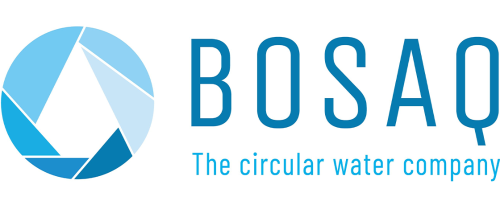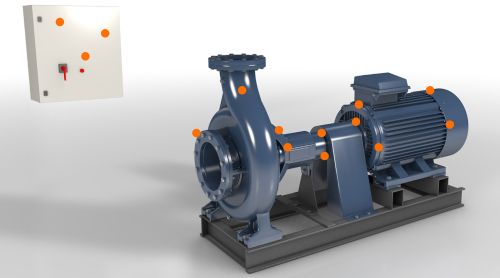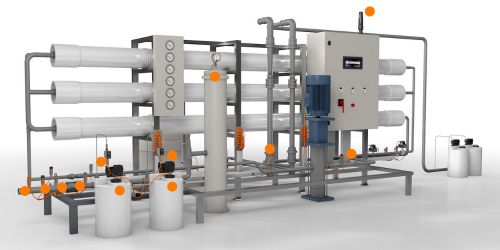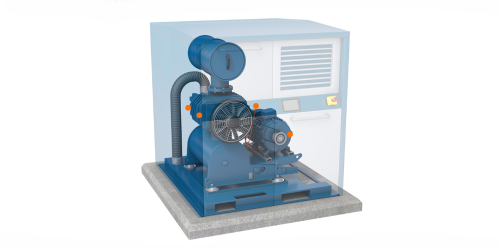Self-sufficient drinking and process water treatment
Safe drinking water for everyone!
The “Blue Planet” has long since ceased to live up to its name everywhere: Water is in short supply in more and more regions. And in many cases, water that is available is not drinkable. The Belgian company BOSAQ has developed a solution that can generate drinking water from water of any quality anywhere in the world. Self-sufficient, reliable and maintenance-free.
“Safe and clean drinking water is a human right” – this was already recognised by the United Nations in 2010. However, the reality still looks different: Over 2 billion people still drink from contaminated water sources and risk falling ill or even dying.
The company BOSAQ from Deinze in Belgium has set itself the goal of actively promoting access to clean water for everyone everywhere in the world. Safe, clean water not only brings economic and social stability and a healthier lifestyle to the countries concerned, it also has a positive impact on the environment.
Jacob Bossaer, founder and CEO of BOSAQ explains the goal of his company: “BOSAQ was created to address one of the biggest challenges we face as a human race. We live in arid areas with a growing world population. We are trying to find a solution to this water shortage by offering recyclable water systems. We provide clean and safe drinking water from any source, be it seawater, river water, lake water or rainwater. We also provide water to the industry. A company uses water from any source, which is often polluted. We upgrade it so that it has the necessary quality to be reintroduced into the process. This way, we ensure the water cycle within a company.”
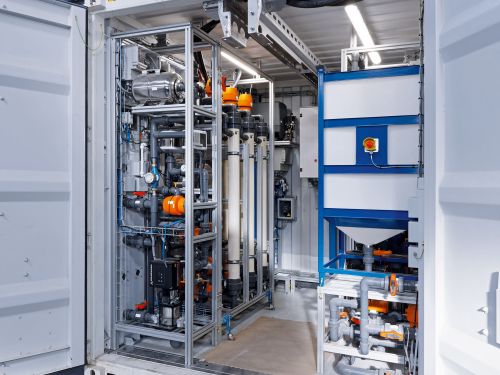

Picture 1: The complete water treatment is integrated in a compact container. Picture 2: Thanks to the solar panels on the roof, the system requires no energy supply and can be placed directly where the water is needed.
The idea was born in Antarctica
The idea started in one of the most remote regions on this planet: on the Princess Elisabeth research station in Antarctica.
Jacob Bossaer spent five consecutive seasons as a water engineer on an expedition in Antarctica: “My task was to build a water circulation system. In just a few weeks, I managed to set up a system that runs on 100 per cent renewable energy. After work, I continued to study the topic by reading relevant literature. I learned that 2.2 billion people worldwide do not have reliable access to clean and safe drinking water. 80 percent of these people live in rural areas. That’s where the idea came from: safe drinking water for everyone. Because what I can do in Antarctica, one of the most hostile regions in the world, I can do anywhere in the world.”
In 2017, Jacob Bossaer teamed up with his long-time friend Pieter Derboven and founded the company BOSAQ. Derboven, who holds a PhD in chemical technology, helped provide an innovative and customised water management solution that minimises the use of chemicals as well as maintenance requirements. The foundation for Q-Drop was laid: A decentralised, self-sufficient drinking water treatment system that is powered 100 per cent by renewable energy – and can be transported and operated in a sea container. This is what makes permanent use possible in the first place, even in remote locations around the globe.
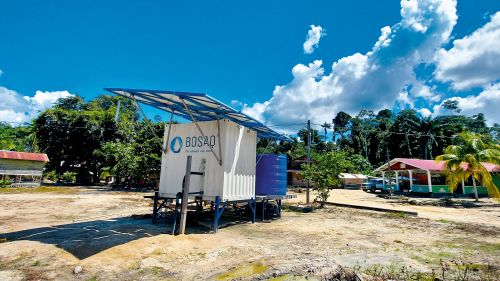
Challenges
Pieter Derboven, co-founder and technical director at BOSAQ, explains: “Our systems can treat a variety of different water types. This can be, for example, surface water, borehole water, rainwater or wastewater from the industry. In our decentralised drinking water applications, we always aim for the high drinking water quality of European standards, even in international projects.
Besides, we also use our systems to generate process water in the industrial environment. In this case, the customer specifies the desired water quality. This can be demineralised water, but it can also be plain drinking water. We always use a multi-stage process for our systems. There is usually a pre-filtration stage, where dirt, large particles and suspended matter are removed. Then we use membrane filtration, for example ultrafiltration, followed by reverse osmosis. For drinking water treatment, the capacity of our systems ranges from half a cubic metre to 10 cubic metres per hour.
For industrial systems, we are aiming for a capacity of 5 to 50 cubic metres per hour. In decentralised drinking water treatment systems, we face completely different challenges than in an industrial plant, for example. First of all, the cost of laying a whitewater pipeline in a remote village is very high. That is why we install a decentralised system directly on site. We search for local water sources and then treat them to the desired water quality. Other challenges are, for example, the logistics of setting up, accessibility, energy supply, but also finding qualified and trained people who can maintain and operate the devices on site.”
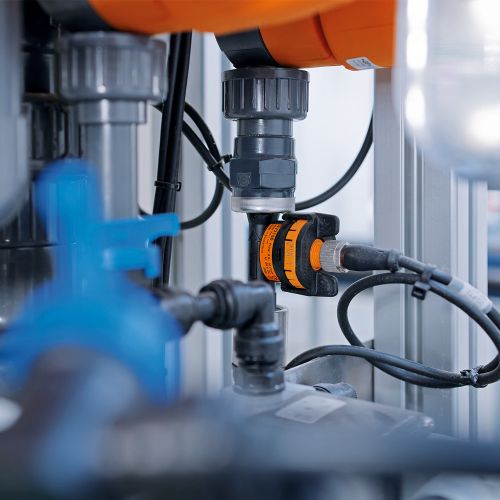


Picture 1: The SV3150 vortex sensor is very well suited for flow measurement with polluted water. Picture 2: The ultrasonic flow sensor of the SU series detects the medium temperature in addition to the flow rate and consumption. Picture 3: The SA5000 flow sensor enables the simultaneous measurement of flow and temperature.
Self-sufficient system
It is not uncommon for BOSAQ’s systems to be located in developing countries, for example in small villages in the jungle where there is no adequate supply of electrical energy. A high degree of self-sufficiency is therefore a fundamental prerequisite that had to be implemented through innovative measures.
Pieter Derboven: “We were forced to develop a lot of innovative solutions. For example, our systems are equipped with an automatic membrane cleaning module developed by us. Our systems can also operate completely independent of the grid, thanks to our own solar power system on the container roof. And last but not least, we can monitor our systems remotely thanks to IoT solutions. We also use AI and receive early messages from the system even before a process parameter reaches a critical warning level. So, via remote access, we have access from our headquarters in Belgium to all our filtration systems worldwide.”
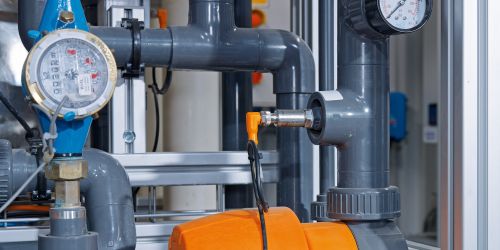
The compact PT5404 pressure transmitter with G ¼ process connection has a robust stainless steel housing for use in confined spaces.
Sensors monitor the process
In process monitoring, numerous sensors are used for control and monitoring. BOSAQ has found a strong partner in the automation specialist ifm.
Pieter Derboven explains how and why the two companies came together: “We got to know ifm at an innovation fair in 2019 and immediately recognised the potential benefits of ifm sensors for our systems: They are compact, they are robust and there are a lot of proven use cases. That was an important factor for us. We asked around for some references and received positive feedback. So we decided to use ifm sensors in our first five drinking water treatment systems in Suriname.”
The actual filtration process is monitored by three different types of sensors.
“This concerns the operating parameters of the process, i.e. temperature, pressure and flow. Temperature, for example, is a crucial parameter to gain insight into the actual filtration performance, as it directly determines the permeability of the membrane. On the other hand, flow and pressure are the main control parameters for our filtration processes, which are also highly correlated. The measured values determine, for example, when rinsing is required,” says Pieter Derboven.
In the future, BOSAQ plans to use additional sensor types.
“We are currently working on a system for an industrial customer where we will install vibration sensors on the pumps. This will give us an insight into the pump condition. This information is crucial for AI-based optimisation of the plant, one of our strengths in industrial commercialisation. We can detect imminent wear at an early stage and plan maintenance measures in good time. And then there’s the new ifm LDL101 conductivity sensor, which we will use to measure the water quality and ensure that the filtration system meets the product specifications stipulated by our customer.”
Conclusion
Reliable, self-sufficient solutions are needed to ensure a consistently high-quality drinking water supply and sustainable process water cycles in industry, even in the most remote places in the world. Powerful sensors not only help to control the process optimally. They are also used to monitor the system so that possible critical conditions can be detected and remedied at an early stage. This way, the goal of securing industrial water supply and improving the drinking water supply for people worldwide can be implemented reliably and in the long term.
